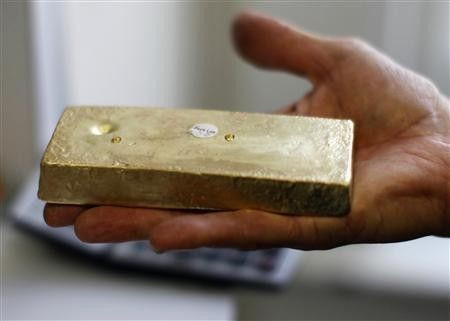Analysis: Record Prices Spawn New Wave of China Gold Bugs

Record gold prices, rather than denting China's enthusiasm for bullion, have emboldened investors to plough more money into gold bars and riskier bullion-based derivatives.
August is traditionally a slow month for Chinese jewelers, but many shops in Shanghai visited by Reuters reported surprisingly solid gold sales over the last few weeks, with shoppers unfazed by gold's stellar price gains over the past few months.
The surge in prices has sparked another gold-buying craze. The 50 gram and 100 gram gold bars were selling like hot cakes, said Ms. Liu, a store manager at Shanghai's major jeweler Lao Feng Xiang Co Ltd <600612.SS>, who said gold sales this month were up at least 30 percent from a year ago.
The attitude of Chinese consumers -- expected to soon overtake Indians as the world's top buyers of gold -- will be an important influence on longer-term trends.
Demand from the world's most populous country, which is adding hundreds of thousands of people to the ranks of affluent and middle-income consumers every year, implies that the long-term price floor for gold is set for a steady increase.
BUYING ON DIPS
That demand may also help smooth out temporary drops in prices.
Spot gold has come off its record highs of over $1,900 an ounce hit last week, falling back to around $1,820 an ounce, but such dips appear only to embolden consumers.
Many Chinese investors and consumers see price corrections as buying opportunities. The view that gold is an enduring store of value is firmly rooted in Chinese cultural traditions, said Hou Xingqiang, a gold analyst at Jinrui Futures.
Gold's rally over the past two years and the debt worries in the West have only strengthened Chinese investors' belief that they need to own the metal as an investment asset.
There is no shortage of bulls on Wall Street forecasting even higher gold prices, with J.P Morgan predicting at least $2,500 an ounce by the end of the year.
Amid the gold frenzy, China's banks and brokerages have been quick to offer paper gold investments to cash in on the trend.
Trade sources at the Bank of China and Industrial and Commercial Bank of China say demand for their gold-linked savings products has soared, while a growing army of retail investors are also eager to dive into the paper gold market.
Expectations that gold will extend its bull run have also encouraged investors into the country's nascent gold derivatives markets, such as the forward and futures contracts on the Shanghai Gold Exchange and Shanghai Futures Exchange.
Volumes for SGE's most popular gold forward contract hit a record high of 350,670 grams in August -- double the volume in July.
More investors are moving into paper gold because of the lower capital costs. The prospect of making big and quick bucks by betting on gold's ascent is beginning to look like a fairly easy way to make money, said He Wei, a gold analyst at Nanhua Futures.
RISKY BETS
That could create other risks down the road, however, which authorities are trying to fend off.
Investors buying gold swaps and forwards generally do so on margin, putting up only a part of the money themselves -- potentially setting themselves up for much bigger losses should the market turn sour.
Alarmed by the surge and worried that the giddying climb in prices was encouraging excessive risk-taking, the SGE raised margin requirements twice this month to 12 percent.
The explosive interest in gold investments has also led investors to move to less mainstream derivative products offered by over-the-counter exchanges that have sprung up in recent years, bringing about new risks given the lower margin requirements.
The Tianjin Precious Metals Exchange, established in 2010, has seen a leap in demand for its swap contracts.
The capital outlay for swap contracts is even lower and it's becoming a popular investment instrument, said Han Qingsheng, a trading manager at Gold Day, a brokerage for the Tianjin Precious Metals Exchange.
While the government is taking a somewhat cautious approach, people's thirst for new investment products will no doubt accelerate China's opening up of the gold sector -- a move long awaited by foreign banks.
In a sign that more changes are afoot, the China Banking Regulatory Commission has already granted membership to two foreign banks to trade gold futures on the Shanghai Futures Exchange.
Industry watchers said changes on the horizon include night trading for the SHFE's gold contracts and expanding the list of domestic banks allowed to import gold -- a big step toward a full liberalization of the sector.
As physical demand increases, the government will need to increase the supply avenues and some foreign banks have an advantage because of links to overseas mints or foreign trades, said a senior executive at foreign bank.
This would be the next step we're all waiting for.
(Editing by Jason Subler and Michael Urquhart)
© Copyright Thomson Reuters 2024. All rights reserved.





















